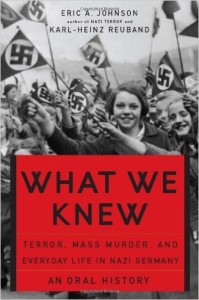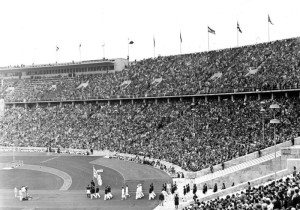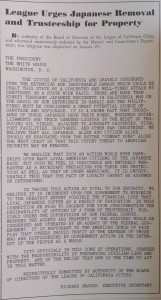


…the Final Solution, despite its “universal” implications, was not a great rupture in all that had come before, but was the outcome of the anti-Semitism that was scripted culturally and theologically into the bedrock of European culture. Eichmann and his cohorts did not randomly go from being ordinary men to being murderers. They traversed a path paved by centuries of pervasive anti-Semitism. They “knew” this road and, given the society in which they lived, it seemed true and natural. (p.183)
It wasn’t until 9 years after the Nazis came to power in 1933 that genocide as the Final Solution to the Jewish question was formalized as national policy at the Wannsee Conference. That’s nine years of tiny baby steps towards genocide, genocide which possibly could have been prevented if strong voices had spoken out against it. This is why we think it’s imperative, and we’re not at the rhetoric we direct at the BIDs yet, to speak out against steps along paths which may lead to oppression, to genocide, as soon as we spot them. And the consequences of wrongly speaking out are so minor compared to the consequences of wrongly remaining silent that we think it’s never a bad idea to risk it.

Furthermore, there’s no particular reason to assume that the internment camps couldn’t have turned into extermination camps. They might well have if no one had spoken out against them, and it might have happened very fast. Assuming they weren’t steps along a fatal road until there was proof that they were would have been a very dangerous risk to take, and everyone alive today has reason to be grateful to the people who fought internment in the press and in the courts at the time. It’s clear, though, that in advocating for internment the League was traveling down a road it knew well, that its members were used to and comfortable with long before December 7, 1941.
By now you can no doubt see our argument. The measures that our Hollywood BIDs and their allies downtown advocate and carry out against homeless citizens of Los Angeles, e.g. confiscation of their property, arresting them on pretextual charges for behavior that’s a direct result of their homelessness, advocating for laws, e.g. against begging, sidewalk vending, etc., that disproportionately impact homeless people and which can be used as tools to cleanse chosen neighborhoods of the presence of the homeless, all of these measures, while they might not be steps on the road to internment of the homeless, their physical relocation, or worse, they also might be. At the very least the BIDs’ constant attacks on homeless people create an environment in which contempt, hatred, and disgust for them are acceptable, just as the behavior of the Nazi government of Germany made open expressions of anti-Semitism, the first step on the road to genocide, seem acceptable to fairly ordinary German citizens. To many fine upstanding citizens of Los Angeles, these anti-homeless measures seem logical, seem necessary, seem justified, just as parallel measures against Jews seemed so to Germans in 1933. Both fear of putatively scheming Jewish alterity and fear of putatively violent mentally ill dirty homeless alterity were/are reasonable to the people experiencing them, and only one seems evil now. Angelenos who support outlawing homelessness, who are frightened by the homeless and want them out of sight, might feel a lot like Germans felt in the mid-1930s. They just might.
The BIDs might not be leading us down the same path as the Germans went down, but they might be. The BIDs almost certainly do not think they’re leading us down this path, but, as with the Nazis, the logic of events can determine outcomes in ways that may be unexpected even to the participants. You may well be thinking that we’re the good guys, and the good guys don’t do stuff like the Nazis did. But the Nazis thought they were the good guys too, at first. You go on from day to day being a good guy and one day you find that, baby step by baby step, you’ve become a very bad guy indeed. By then you’re encircled by avenging armies and frantically burning the evidence but it’s too late.
Outwardly, to us, the little steps the BIDs are taking don’t seem so different to those taken by their Nazi forebears and we refuse to become comfortable with the path they’re leading us down. That is why we compare BIDs to Nazis. We hope you’ll consider reading the books discussed here if you’re still doubtful.
Images of book covers are fair use. Image of 1936 Berlin Olympics is public domain and we got it from Wikimedia. They claim it’s released under some kind of Creative Commons license but, frankly, we don’t believe this is plausible. Image of League of California Cities telegram is a photograph of part of page 20 of the League’s journal Western City and is reproduced here under the doctrine of fair use.

it is NOT unfaur to compare BID to nazi persecution. As a homeless person i experienced it. As an angeleno not homeless i saw it and Ive seen it still. How many people are unfairly doing life sentences because of the LA BID’s? I know one thing- they WONT interfere with gang members. They are scared of them. Beating down a man after he tries to get out of encircling bicycles and say he assaulted them; weakness.
i generally do not like how quik people use the term nazi. Here it is fair.